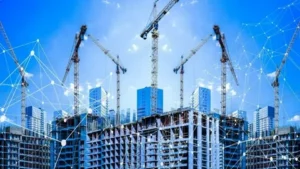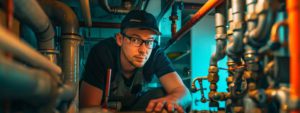Plumbing issues are like unexpected guests—they can be uninvited and disrupt your day. But fear not! You can tackle these common plumbing problems like a pro with some know-how and a positive attitude. Let’s explore the methods for ensuring your pipes are content and water moves without interruption.
DRIPPING FAUCETS
The Problem: That rhythmic “drip, drip, drip” sound is annoying and wastes water and money.
The Fix: Repairing a leaking faucet is often as simple as swapping out a worn washer or O-ring. Begin by shutting off the faucet’s water supply. Then, carefully disassemble it, replace the damaged component, and finally, reassemble the faucet. Voila! No more drips.
CLOGGED DRAINS
The Problem: Whether it’s a slow drain or a full-on clog, water not draining correctly is a headache.
The Fix: You can use a plunger or a drain snake for minor clogs. Additionally, baking soda, vinegar, and hot water can effectively dissolve grease and debris. If the clog persists despite these efforts, it may be necessary to seek assistance from a professional plumber.
RUNNING TOILET
The Problem: The constant sound of water running in your toilet tank is noisy and wasteful.
The Fix: Inspect the tank by opening it and verifying whether the flapper valve is sealing properly. If it’s not, adjust or replace it. You can also check the float to ensure it’s at the right level. These simple adjustments can often stop a running toilet in its tracks.
LOW WATER PRESSURE
The Problem: Low water pressure can turn showering and dishwashing into frustrating tasks.
The Fix: Examine whether mineral deposits obstruct the aerator on your faucets. Remove it, clean it thoroughly, and reinstall. If that doesn’t help, check for leaks or blockages in your pipes. A professional cleaning or pipe replacement may sometimes be necessary to restore proper water pressure.
LEAKY PIPES
The Problem: Leaks not only result in water wastage but can also lead to water damage within your home.
The Fix: Depending on the size of the leak, you may be able to temporarily patch it with a pipe clamp or plumber’s epoxy until you can get a permanent fix. For more significant leaks, shutting off the water supply to that area and promptly contacting a plumber to prevent further damage is advisable.
WATER HEATER ISSUES
The Problem: No hot water or fluctuating temperatures can indicate water heater problems.
The Fix: Examine the thermostat settings on your water heater and make adjustments if necessary. If this doesn’t resolve the problem, it may indicate a defective heating element or sediment accumulation in the tank. In such cases, it’s advisable to have a professional inspect and repair your water heater.
BURST PIPES
The Problem: A burst pipe can lead to substantial water damage and demands urgent action.
Solution: If you suspect a burst pipe, promptly shut off the main water supply to your home. Then, contact an emergency plumber to assess the situation and carry out any necessary repairs. Prompt action can help minimize damage and restore water flow quickly.
SEWER LINE BACKUPS
The Problem: Sewer line backups can lead to unpleasant odours, slow drains, and potential health hazards.
The Fix: If you notice signs of a sewer line backup, such as gurgling drains or sewage backups, contact a plumber specializing in sewer line repairs. With their equipment and expertise, they can efficiently diagnose and address sewer line problems, restoring proper drainage and sanitation to your home.
GAS LINE LEAKS
The Problem: Gas line leaks pose a plumbing and safety hazard.
Solution: If you detect a gas odour or suspect a gas line leak, evacuate your home right away and contact the gas company’s emergency line. They will quickly shut off the gas supply to your property. Once safe, contact an emergency plumber trained to handle gas line repairs. It’s crucial to never try fixing a gas line leak on your own.
WATER QUALITY CONCERNS
The Problem: Issues with water quality, such as discoloration, foul odours, or strange tastes, can indicate underlying plumbing problems.
The Fix: A plumber can conduct water quality tests to identify the cause of the issues. They can also install water filtration systems or suggest suitable treatments to enhance the quality of your water supply. Don’t ignore water quality concerns; they can impact your health and comfort.
PREVENTIVE MAINTENANCE
The Solution: Regular maintenance by a plumber can prevent many plumbing problems before they become emergencies.
The Fix: Arrange yearly plumbing inspections and maintenance checks with a licensed plumber. They can detect potential problems early on, perform essential repairs or replacements, and guarantee that your plumbing system operates efficiently. Prioritising preventive maintenance can save you from costly emergency repairs down the line.
CONCLUSION
Addressing these common plumbing problems and understanding when to call an emergency plumber can help you maintain your home’s functional and efficient plumbing system. Remember that being proactive with maintenance can help you avoid significant plumbing issues. Stay informed, stay prepared, and enjoy uninterrupted water flow and peace of mind!





Be First to Comment